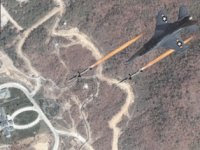Agam's Gecko


Monday, November 26, 2007
WHO IS RESPONSIBLE?
 Artist's wishful conception of an air strike on Than Shwe's mansion in Nay Pyi Daw. Photo: The Irrawaddy |
| T |
he question is not, "Who is responsible for slaughtering and abusing Burmese citizens and monks?" Everyone knows the answer to that. The question is, "Who is responsible for the protection of Burma's people?" When a state is the egregious abuser of its own citizens, no less than when a family head is abusing his or her own children inside the home, humanitarian intervention is called for.
These principles -- the responsibility to protect, and humanitarian intervention -- were developed in the 2001 report of the International Commission on Intervention and State Sovereignty, and the Canadian government. The central theme of the report, lauded by former UN Secretary General Kofi Annan as one of the UN's greatest achievements, is the idea that "sovereign states have a responsibility to protect their own citizens from avoidable catastrophe, but that when they are unwilling or unable to do so, that responsibility must be borne by the broader community of states."
In 2005, world leaders agreed. "[S]tates have a primary responsibility to protect their own populations and ... the international community has a responsibility to act when these governments fail..."
The UN Security Council reaffirmed the responsibility to protect in an April 2006 resolution, and invoked it for the first time last August in a Darfur resolution. The Responsibility to Protect is now an international doctrine.
Somebody must have told Burma's democracy lovers, isolated though they are under the junta's draconian controls.
U Pinyazawta, a leading monk from the Alliance of All Burmese Buddhist Monks, told The Irrawaddy by phone from his hiding place in Burma: “We need a foreign army to protect us,” he said, referring particularly to UN troops.I recall that after the US invasion of Iraq, Burmese regime lackeys in Burma internet discussion forums were taunted with the idea that Than Shwe could be next. The two "regimes of fear" had much in common, and the possibility of liberation -- however unlikely -- stirred many hearts. US diplomatic staff in Burma received a number of letters, asking, "When are you coming to Burma?" This is the period in which Than Shwe decided to move the nation's capital to a remote site near the town of Pyin Ma Na.
Some Burmese were even more straightforward.
“We need air strikes,” said a prominent editor and CEO of a successful privately-run publication in Burma.
He claimed many Burmese would welcome military intervention. “This is our hope,” he said. “The regime is unyielding. We have to teach them a lesson or two.”
In September 2003, in a lively talk at the Foreign Correspondents’ Club of Thailand in Bangkok, Ross Dunkley, editor of the semi-official newspaper, Myanmar Times confirmed that all the Burmese people he had met—whether they were taxi drivers or office workers—wanted to see an invasion. “They all want George W Bush and the UN to come into Myanmar [Burma] with a whole lot of guns and airplanes and jets and solve the problem. They believe that’s possible,” said Dunkley.The self-directed isolation of the regime in Nay Pyi Daw since that time only ensures that, under such a scenario, collateral damage would be almost nil. Quite a number of Burmese, it seems, would prefer to trade "smart sanctions" (which attempt to hit the junta without harming the people) for "smart missiles."
The General Secretary of the Shan Democratic Union, Mr. Sai Wansai wondered where this new international principle had gone, barely a week after the killing started.
The only way to stop this "reign of terror" and tyrannical rule in Burma is a full scale humanitarian intervention. Where have all the noises of "responsibility to protect", which unofficially have been endorsed by almost all democratic countries gone? ...According to the ICISS document, any form of humanitarian military intervention under the principle of Responsibility to Protect must fulfill six criteria in order to be justified:
Furthermore, the so-called “non-interference” notion should be only valid for countries, which adhere to democratic principle, where the ruling government protects and look after its citizens and not that is slaughtering and harming the populace.
As such, the military junta of Burma cannot be granted the privilege and treatment with internationally accepted norm of “non-interference” of a sovereign state.
- Just Cause
- Right Intention
- Last Resort
- Legitimate Authority
- Proportional Means
- Reasonable Prospect
The UNSC is yet to consider how the now-established Responsibility to Protect will be used to guide its actions in the future. So this could take a while. But the case of Burma should be foremost in their minds when they do get around to considering it.
Labels: Burma











 Our way of saying "thanks" in the Thai way. Here a nak muay Thai (kickboxer) offers respect and thanks for his teacher (wai khru) before a match. This is our local variation on the ubiquitous "hat tip" used in general blog culture.
Our way of saying "thanks" in the Thai way. Here a nak muay Thai (kickboxer) offers respect and thanks for his teacher (wai khru) before a match. This is our local variation on the ubiquitous "hat tip" used in general blog culture.




